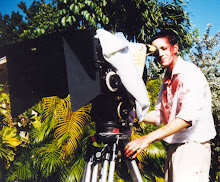
*****
Director
&
Writer:
Francois Truffaut
25 years ago, the world of Cinema lost a major talent. Mr. Truffaut's untimely passing at the young age of 52 due to cancer, left a void in world cinema, but his films remain behind to speak for him and are still cherished as treasured examples of what cinema and storytelling are all about. In honor of the sad anniversary, I bring to you a new appraisal of his first and most-classic film.&
Writer:
Francois Truffaut
Odds are, you've at least heard of the film before. It is basically an autobiographical look at Truffaut's childhood through the lens of nostalgia and regret. Antoine Doinel (Jean-Pierre Leaud, who's young face has almost become a trademark for French New Wave Films) is your average trouble making student. He lives in a cramped little apartment with his uncaring mother and stepfather, and the film sets us up early for the fact that whenever Antoine steps out of line, he is punished.
He and his friend Rene decide to steal a typewriter from the office of Antoine's stepfather in order to pawn it for spending money, but the plan backfires and they are arrested. After this last of many serious indiscretions, his parents hand him willingly over to the state and basically wash their hands of him. He is put in a juvinile prison of sorts and later shipped out to a work camp by the sea for hopeless cases. We later find out that Antoine's mother was planning an abortion when she found out she was pregnant but had him anyway. Maybe the fact that he knows that forces him to act out to get her attention; maybe even get her to love him like he's always hoped she would.
The last shot of the film is the most famous one. Antoine makes a break from the prison camp, searching for freedon, yearning to be his own man and make his own way in life. But, sadly, he reaches the shore of the ocean and realizes he is trapped. He is not only trapped physically, but spiritually as well. To truly escape this prison of other people's rules, he must conform and thus give himself up to the uncaring world from which he tried to escape.
Antoine comes off as not only a young Truffaut, but as all young people. We are all searching for the same basic thing he was in the film: acceptance. To me, the film is very powerful because of that blunt, cold ending. It seems like the end (or "fin" in this case), but it never really is an end until the person dies. So you will be forced to interpret the ending as more of a change in Antoine's tactics, and an obvious sign to the fact that he must now grow up. This is Truffaut's most precious message to his filmic alter-ego (Antoine appears in 3 more films, which continue the adventures of his growing up, plus a short). Swallowing the realities of an unfeeling society can be tough, but we all have to grow up eventually.


No comments:
Post a Comment